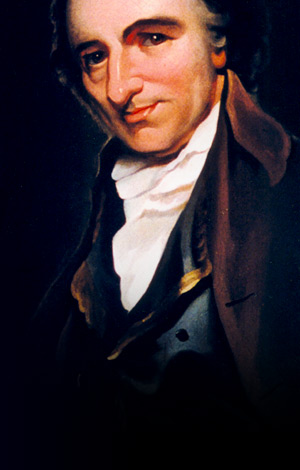Study Guide
RELIGION AND SCIENCE ENHANCED BY THE GIFT OF REASON
“The true Deist has but one
Deity; and his religion consists in contemplating the power, wisdom, and benignity
of the Deity in its works, and in endeavoring to imitate Him in everything
moral, scientifically, and mechanical.”
The Age of Reason
“The choicest gift of God to man (is) the gift of reason; and having endeavored to force upon himself the belief of a system against which reason revolts, he ungratefully calls it human reason, as if man could give reason to himself.”
The Age of Reason
“He would then see that all the knowledge man has of science, and that all the mechanical arts by which renders his situation comfortable are derived from (the munificence of the Creator); his mind, exalted by this science and convinced by the fact, would increase in his gratitude as it increased knowledge; his religion or his worship would become united in the improvement as a man; any employment he followed that had connection to principles of creation—as everything of agriculture, of science, and of the mechanical arts has—would teach him more of God and of the gratitude he owes him.”
The Age of Reason
Commentary
Thomas Paine was a self-declared “Theophilanthropist”: a lover of God and Man. He believed that reverence for Deity, Man, and Nature make society truly benevolent and was the harbinger of a universal civilization of the heart. Paine pointed to “our living awareness of the Infinite Presence” in an empyrean which ever renews and enlarges man’s potentials for reason and of reasoning together for the good based on natural law. Paine believed man is accountable to Deity first and Deity is the source of man’s ability to “step back” and refine a reasoned conscience in dialogue with others. In this sense, Paine valiantly fought for universal human rights not so much for the personal freedom to do as we wished, but as an expression of Deity, reflected in each person’s innate dignity. As trustees of natural rights, we are obligated to cooperate and reason for the common good.
Questions
- How can we understand, define, and then encourage science and religion to do good for all of mankind?
- How can we use the discipline of science and/or the religious quest to improve ourselves and our reasoning broadening and deepening our awareness of larger spheres of knowing with humility?
- How can scientists and religious practitioners see themselves as partners in pursuing knowledge for the good and the disinherited rather than being mutually walled off from each other?


